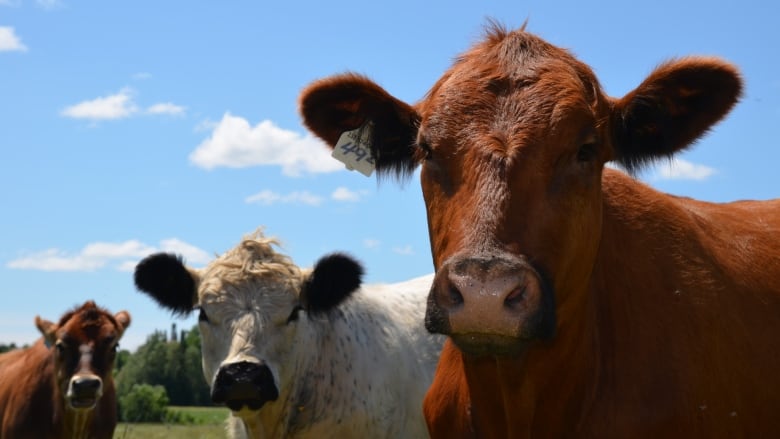How P.E.I. Could Help With an Increased Demand for Beef

The Maritime Beef Council says demand for beef is going up, and P.E.I. might be able to help meet that demand
by Travis Kingdon – CBC News
“We’re actually seeing increased demand for beef regionally, nationally and internationally as well,” said Brad McCallum, with the Maritime Beef Council and managing director of the Nova Scotia Cattle Producers.
But the number of cattle available in the Atlantic region has fallen from 63,700 in 2007 to 42,300 in 2016.
“It’s all about knowing what that consumer wants and producing for their requirements.”
— Brad McCallum, Maritime Beef Council
As far back as 2003, bovine spongiform encephalopathy, or mad cow disease, had a significant impact on the regional herd, McCallum said, and numbers haven’t rebounded.
“As we went through into the early- to mid-2010s we actually saw historically-high market prices,” McCallum said.
“A lot of the industry participants at that time actually saw that as an opportunity to liquidate their herds and gain maximum value back out of their animals and their farms.”
Russ Mallard, president of Atlantic Beef Products, said that as producers retire, many haven’t had a plan to keep their farm going, adding to the shortage of supply in the region.
Meanwhile, the company is expanding and needs more than 15,000 animals to fill the demand, Mallard said. That’s a need of 300 per week.
“We know that we get every animal we can locally from the three Maritime provinces, and we find ourselves going to Quebec quite regularly.”
The cattle industry goes hand in hand with the potato industry on P.E.I., McCallum said.
“Having a rotation within the potato crop allows for the production of grains and also allows for the production of forage, which can be then used to feed cattle,” McCallum said, adding cattle also produce manure for farmers.
McCallum also said there is some unused capacity in feedlots.
“There are also some that would be sitting empty … that could be brought back into production,” McCallum said. “There’s a lot of infrastructure that already exists, it’s about maximizing that infrastructure.”
With Atlantic Beef Products — the major processor in the region — on P.E.I., McCallum said it makes logistical and financial sense for the animals to be shipped to feedlots here.
In order to address the deficit, the beef council is working on educating producers to make them more efficient.
McCallum said he thinks that producers have a role to play in bringing stability to the market.
“One of the big things that we want to see is producers being more engaged with themselves … more engaged with the next person down the production chain and then ultimately with the processor and the consumer,” he said.
“It’s all about knowing what that consumer wants and producing for their requirements and without knowing that, it’s really hard to predict, it’s really hard to know if you’re going to be profitable.”
Mallard said given the volatility of the industry, he thinks more of a guarantee, like those that exist in other markets, could help attract people to the industry.
“Price insurance — and that basically gives the producer an advance knowledge of what they’ll get for their beef six months out,” he said.
“And that involves a contract and securing beef futures and it’s available pretty widely in Western Canada.”












